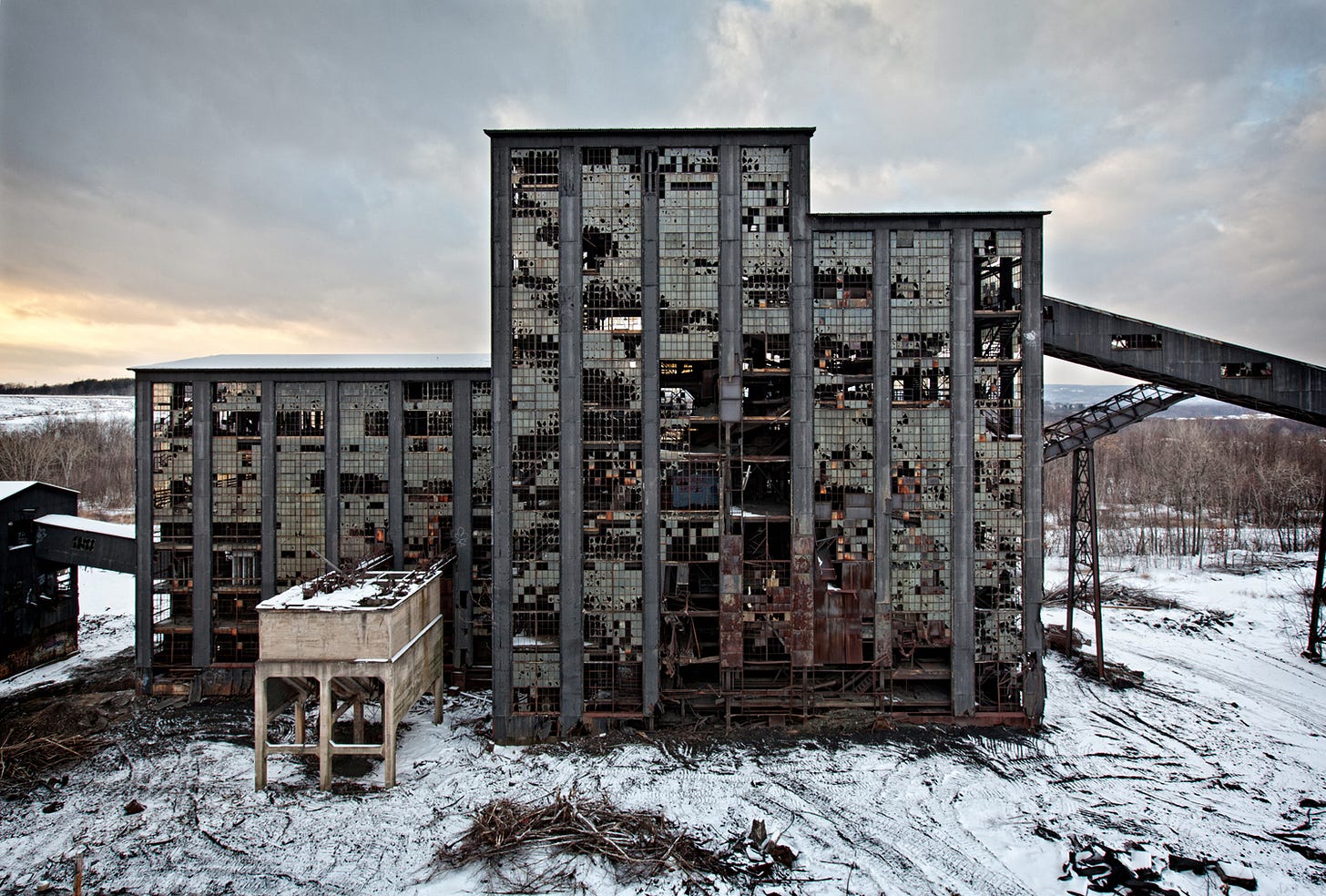I’m just on edge all the time
Hello everyone, Eoin Higgins here from The Flashpoint.
Last week, I talked to Joe Dumont, a 32-year-old Lincoln Park, Michigan man, about his struggle to survive as bills and debts keep piling up.
You can read the full article at the link (no paywall on this one, but if you’d like to subscribe here’s a 20% off code).
Here’s an excerpt.
It’s not that Dumont hasn’t been trying to get a job. But without a phone or reliable transportation, that’s difficult. Dumont’s also a high school dropout, another hurdle to getting a job (one I can personally attest to). He’s turned to donating plasma for money, but was deferred because of a resting blood pressure of 160 over 110 and a pulse of 114.
“I’m just on edge all the time it feels like,” Dumont told me. “I haven't been to the doctor or anything to see if there’s a medical issue, I generally feel okay but I don't know.”
Dumont was approved for state aid to help with his circumstances. It was a relief, he told me, but it’s only a delay—not a reprieve.
“They're going to pay $350 on the water bill only if I pay the other $1,500 by Feb 16th,” he said. “If I needed help with $350 of it I'm not sure how they think I can come up with $1,500.”
The power and heat won’t get shut off, but the remaining balance—which will be over $200—is due the 16th as well.
It’s easy to see how things escalate. Dumont could get a job if he had a phone. He could go get a phone (if he had the money) if he could drive his car. He could afford the repairs for his car with a job applied for online, if he had internet. He could pay his internet bill if he wasn’t in danger of losing power. He could pay the power bill if he wasn’t worried about the heat bill. He wouldn’t be worried about the heat bill if he wasn’t worried about the foreclosure on the house, which in turn he could manage if he could afford to navigate probate court.
Dumont’s circumstances are a perfect example of how difficult it is being poor in America. It’s almost impossible to ever get ahead as every bill stacks on top of every debt, keeping you scrambling for any possible income to keep your lights and heat on and stay fed. Life for the working poor in the US is a perpetual bust out, indebted to invisible gangsters who outsource the dirty work of stripping down your life for parts until you have nothing left to give.
“I’m just drowning here,” Dumont told me.
Thanks for reading—here’s the rest of the gang.
Wars of Future Past
Kelsey D. Atherton
Here is a prediction: by 2050, we will have a remake of Saving Private Ryan that focuses on a team of soldiers sent to retrieve an especially sentimental robot. This prediction is vexed by the existence of nuclear weapons, which suggest a future World War ends before there’s time for Spielbergian beach landings, but regardless. In a war fought in this or the next few decades, I fully expect to see a heroic narrative of self-sacrifice on behalf of a beloved robot. If not in the form of Saving Private Ryan, then at least in the style of War Horse.
In today’s upcoming Wars of Future Past, I reexamine a 2015 funeral for companion robots in light of The New Breed, a 2021 book by researcher on robot ethics Kate Darling. By looking to the history of how humans have related to companion animals, even ones whose primary function was as farm or military labor, Darling suggests we’re bound for a future where humans value the robots they fight alongside the same as if they were living and breathing beings.
BORDER/LINES
Gaby Del Valle & Felipe De La Hoz
In the run-up to Trump getting elected, liberals were tripping over themselves to show how much they valued and were willing to protect immigrants. Mayors across the country declared their cities “sanctuary” jurisdictions. But the idea of a sanctuary city was always a nebulous one. In the liberal imagination, sanctuary cities are a place where undocumented immigrants can feel safe from deportation. In the conservative mind, they’re lawless jurisdictions where local governments and law enforcement agencies actively work against ICE’s enforcement efforts. Neither of these characterizations is entirely true.
There is no clear definition of a sanctuary city. At best, a sanctuary jurisdiction is a place where local law enforcement won’t go out of their way to do ICE’s job for them. Jails in sanctuary jurisdictions don’t detain non-citizens who have been slated for release so immigration agents can pick them up, a practice known as “ICE detainers.” Local police departments and sheriff’s offices don’t participate in 287(g) agreements, partnerships with federal immigration agencies that essentially deputize local cops for ICE. But that’s it. There’s no way for a city, county, or state government to actively work against ICE.
Now that Biden is in office, you’d think the sanctuary city argument would have died down. But in a speech before the U.S. Conference of Mayors, Homeland Security secretary Alejandro Mayorkas asked mayors of sanctuary cities to reevaluate their stance. Mayorkas claimed that the Biden administration’s new enforcement guidelines prioritized “justice and fairness and equity,” marking a clear distinction between Biden and his predecessor. So, he said, cities that refuse to collaborate with ICE should reconsider, and should embrace the Biden administration’s kinder, gentler version of arresting and deporting non-citizens.
Last week’s edition of the newsletter focused on Mayorkas’s comments and broke down just how little “sanctuary” jurisdictions can actually do to protect immigrants. We looked at the vast data collection and information-sharing policies that all jurisdictions—even self-proclaimed sanctuaries—have to adhere to. Of course, local governments could always do more to actively help ICE’s mission; the question is why an administration that promised to reimagine our immigration system is asking them to do so.
The Insurgents
Jordan Uhl & Rob Rousseau
This week we’re talking to Jen Psaki press conference addict Marcus, from the relatively popular Twitch stream Left Flank Vets, to talk about the bizarre tendency of powerful liberals representing the Biden Administration to react with mocking contempt anytime someone dares to question whether they can do the basic job they were elected to do. We also talked about Joe Biden finally doing something cool (calling nepotistic failson Peter Doocy a “stupid son of a bitch”) and how anyone asking critical questions about the U.S.’s relentless campaign to escalate tensions with Russia and Ukraine is actually part of a devious network of Putin propaganda.
Sick Note
Libby Watson
I wrote a little bit about the proposal to expand Medicaid to all undocumented people in California, which would be a major victory—but only if it comes with clear and prolific messages about the change in policy. The usual approach of American government towards immigrants, particularly on public benefits, but across the board, is so absurdly draconian that it’ll take some time to undo that damage, which was obviously massively escalated under Trump (and not reversed much by Biden, so far). I also republished a great article from Discourse about the slog of getting paid medical leave in this country, which I’ve personally experienced too.
Welcome to Hell World
Luke O’Neil
The other day I published one of my favorite interviews I’ve done in a while. It was with writer and photographer Matthew Christopher, the guy behind the Abandoned America series of books. We spoke about his work photographing abandoned churches and prisons and factories and so on and the decline of the “American dream.” You can read it here.



Today I’ve got two great guests. Karen Geier, who previously wrote about the mass graves found in Canada’s residential school system and the country’s continued allegiance to Nazi monuments, as well as its response to Covid, gets us up to speed on what is going on with the Canadian “truck convoy” protests.
…So, we’ve made it nice for the Nazis, we’ve fucked up our response to a once in a 100 years pandemic, and the government is “too nice” to tell these total knobs to “fuck off on ice.” Now at the tail end of the coldest month of the year, a bunch of dweebs, fortified by some of the worst sandwiches on earth, made to the tune of “O, Canada!” set off to the nation’s capital under the guise of protesting “vaccine mandates for truckers.”
There’s only one problem with that: Truckers are some of the most highly vaccinated people in the country. The Trucking Alliance estimates about 90% of truckers in Canada are vaccinated because… it’s a condition of entering the United States of America. 90% of Canada’s population live within 200 kilometers of the United States border and most of our goods are imported from our neighbors to the south. This was a non-issue from the start.
Then Rax King writes on the ten year anniversary of an amazing, beloved, and misunderstood album, Lana Del Rey’s Born to Die. Previously I published an excerpt from her really good recent book Tacky on the band Creed.
I have said little about Del Rey’s actual music, ostensibly the thing I love about her. (That thing is certainly not her public self, Jesus Christ. At the very least she’s guilty of putting her foot repeatedly and churlishly in her mouth, at worst of racism and mid-pandemic thoughtlessness.) What is there to say that scores of critics haven’t said better? Well, I’ll try: her voice sounds the way a cup of Valrhona drinking chocolate tastes. Listen to “Video Games” now; it will literally warm you. The arrangements on Born to Die can lack in dynamism, but in standout songs like “Born to Die” and “Radio,” they’re the ideal wall of sound for the Spring Breakers generation. Del Rey made both woozy romanticism and its subsequent nihilism so fun. She dies a lot in those early music videos. She’s abject in them, begging, mewling, crawling, or else so deadpan as to unsettle. The effect is as if the video in The Ring was made by your high school’s most stylish D student.
That one is for paid subscribers only. Here’s a 20% off coupon if you’d like to check it out. Thanks for reading and for your support.



